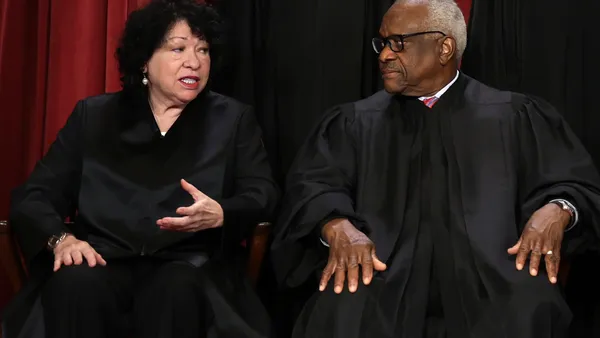Dive Brief:
- Schuff Steel, a Phoenix-based steel fabrication company, agreed to pay $500,000 to settle allegations that a plant manager harassed Black and Latino employees and retaliated against them for complaining, the U.S. Equal Employment Opportunity Commission announced Dec. 20. Under a three-year consent decree, the company, which did not admit to wrongdoing, also agreed to implement companywide policy changes and prevention measures, including ensuring that a hotline is available for complaints.
- According to the EEOC’s allegations, the plant manager at the company’s Eloy, Arizona, facility regularly used racial slurs and epithets against Black and Latino employees and ridiculed Latino employees who didn’t speak English well, the agency said in media release. Also, on several occasions, the plant manager allegedly declared “White power” in front of Black employees and fired employees who complained about the harassment or moved them to the night shift. After conciliation attempts failed, the EEOC sued Schuff Steel for alleged race and national origin harassment and retaliation in violation of Title VII of the Civil Rights Act of 1964.
- In addition to paying the aggrieved employees, the consent decree requires the company to retain an outside consultant or outside legal counsel to review and revise its EEO policies and procedures. It will also have to provide anti-discrimination training to its employees, managers and HR personnel at the Eloy facility and at its Phoenix headquarters. “Employees — no matter what industry they work in, their racial background, or their national origin — have the right to work in an environment free of harassment and discrimination and without the threat of being fired or retaliated against for complaining,” EEOC Regional Attorney Mary Jo O’Neill stated in the release. “It is particularly troublesome that this behavior was done by a manager,” O’Neill noted.
Dive Insight:
Fueled by a number of factors, including a budget increase and Senate confirmation of Commissioner Kalpana Kotagal to the board restoring the agency’s Democratic majority, the EEOC is returning to a heightened level of litigation activity not seen in years, employment lawyers recently observed.
In its strategic enforcement plan for 2024 to 2028, the EEOC said it would focus in part on preventing and remedying systemic harassment. The Schuff Steel case appears to carry out these objectives: “This settlement demonstrates that the EEOC will continue to work tirelessly to root out discrimination where it is found, in any industry,” Nancy Sienko, acting director of the agency’s Phoenix district office, stated in the release.
Employers should be familiar with what the EEOC emphasizes in an FAQ as the most important prevention step — clearly communicating to employees that unlawful harassment will not be tolerated and that employees who violate this prohibition will be disciplined.
The consent decree in Schuff Steel provides a compliance road map for other employers. It details what an anti-harassment and anti-discrimination policy must say, how investigation into complaints must be conducted, and which records must be retained.
For HR professionals, the requirements are a reminder of the critical role they play in preventing and remedying harassment. For example, the company’s HR staff must undergo five hours of training on Title VII and other federal anti-discrimination laws each year for the duration of the decree. This is more than what’s required for nonmanagerial employees (one hour each year) and supervisors and managers (three hours annually).
In addition, HR staff must be trained on the proper methods for receiving, handling, investigating and ameliorating harassment and discrimination and on the proper procedures for documenting and preserving evidence, as well as detailing the consequences and results of an investigation where harassment or discrimination is found.
The company must also emphasize to HR staff and supervisors that due to their positions of power: 1) They must be particularly vigilant not to discriminate; 2) be sensitive to how their actions or words may be perceived; and 3) avoid the temptation to retaliate against an employee because a complaint is made, or might be made, against them.













